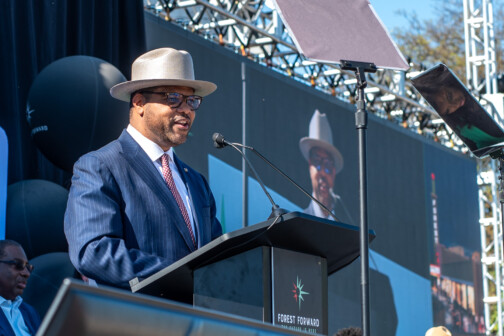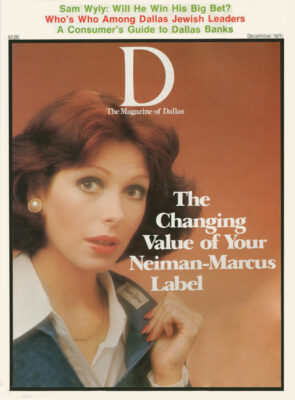Last month we left Rabbi Olan at Brid-well Library, in the Bishop’s Room, reflecting skeptically on the present state of affairs. He felt that the great leaders are gone, forgotten, uninterested or ineffectual.
And one wonders-is the rabbi right? Who are today’s leaders? Is there a Jewish Establishment like the one which existed in the Thirties, Forties or Fifties? Who speaks for the Jews of Dallas?
Obviously, the question cannot be answered simply. In fact, my thesis is that, unlike the past, it has now become increasingly difficult to single out power pockets and declare -here, these are the men and women who decide. The rulers and demi-rulers are many, and the spheres of influence cover the ethnic map like the measles. A complete, full-blown chart, the sort which Esquire occasionally creates on the Literary Establishment, designed to correspond to actual power and influence of Dallas Jews, would look like the result of abstract mathematicians gone mad in a doodle contest.
Some generalizations do apply. As in the non-Jewish community, today is the day of the many and not the few. Power is diffuse, spread out, and consequently thin. Large public statements in the name of the Jews of Dallas no longer come from a single source or a cohesive group -or come at all. Social feelings, political alignments, financial successes, attitudes toward Israel-these are matters which have dramatically changed Dallas Jewry in the past 20 years. Today the community does stand firm behind the Jewish state, but that’s about all that is generally agreed upon. (The one exception may be Golden Acres, the Jewish home for the aged, which is viewed by practically everyone as an innovative and progressive institution-in fact, one of the country’s best.)
So what does that leave us? A mess of names, a smorgasbord of organizations and sub-organizations, each of which is involved, one way or another, in things Jewish. It is wrong to say, for example, that the sons of the old leaders have abandoned their role. It’s true that Henry Miller, Jr. is not active in Jewish affairs the way his father was, but he is heavily involved in cultural matters throughout the city. No neat formulas emerge; patterns do not exist.
Finally, then, my plan is a strictly personal one: to map out before you those groups and people who, to my own limited way of thinking, rule one roost or another. By design, my list is small and select. I’ve intentionally pointed to areas which seem symbolic to me. I have not been exhaustive, but I hope I have been judicious.
THE INSTITUTIONS
Gentiles often wonder at the organizational skill of Jews. And they are right-traditionally Jews in American life have been movers and shakers, expert organizers (in the arts, in politics) and sophisticated fund-raisers, both for Jewish and non-Jewish causes.
The Jewish Welfare Federation
Like the United Fund for Dallas, the Federation is the one umbrella under which Jews have joined together in order to finance charities which aid other Jews. But unlike the Fund, the Federation’s money in part travels overseas -to social services in Israel or, in another instance, to aid Jews in the Soviet Union. The Federation also helps to fund local agencies such as Jewish Family Services (which helped settle Vietnamese refugees here), Golden Acres, etc.
For years the Federation was run by one man, a professional fund-raiser and organizer-Jack Kravitz. Kravitz, sweet-mannered and soft-spoken, is a master politician who carefully and deliberately took the Federation through difficult changes. He was a surgeon, the Federation his ailing patient whom he made certain survived a blood transfusion. When he came to Dallas in the Forties, the Federation was run by Temple Emanu-EI leaders. With increased interest in Israel, a shift took place. The lay leadership and the bulk of money began to flow from another source, people associated with the conservative synagogue, Shearith Israel. Kravitz started working that side of the street and did so to wonderful effect.
Now Kravitz is retired and so is his replacement, Walter Levy. The Federation, still the most powerful organization in Dallas Jewish life, is looking for a director. Some complain that the Federation (which continues to be the central fund-raising body in the Jewish community) has become too powerful. But complaints or no complaints, the organization will, I suspect, weather the present leadership crisis and continue its central role. Israel is simply too important for Jews to neglect; it will continue to be a critical concern.
The American Jewish Committee
Unlike the Federation, AJC is a relatively small organization which specializes in community relations. It believes, nationally and locally, that what’s good for minorities is good for Jews and does an enormous amount of behind-the-scenes work in areas of community-wide interest. Its membership often has a liberal bent, although its intellectual currents may flow in many directions. (Nationally, for example, AJC publishes Commentary which has grown increasingly conservative, especially as the Third World continues to attack Israel.)
Billie Frauman has been a paid professional for nearly 20 years at AJC and, like Kravitz, understands the politics of Jewish community activities. She is retiring this year and will leave a tremendous vacuum. The organization is probably the most sophisticated of its kind in the city and has been involved in a surprisingly wide range of non-Jewish problems. The work done nationally and locally on civil rights, for example, is little known. The AJC, like Frauman herself, is strong, efficient and low-profile; that’s the way they like it.
The Synagogues
Once Temple Emanu-EI was the most influential and prestigious congregation in town. That may still be true today, but certainly to a much smaller degree than ever before. With Olan’s departure, Temple has lost its most important voice in the community.
Shearith Israel, the conservative synagogue, and Tiferet Israel, the orthodox, are both enjoying periods of growth. They never had the sort of professional staff that typifies Temple and never had a rabbi of Olan’s stature in the general community. But Jewish sentiment in Dallas has been moving towards the traditional and towards Israel which, in part, explains why things have been looking up for both congregations.
Temple Shalom, a second reform congregation, was born out of Temple Emanu-EI with the blessing of the older congregation (which was growing too large anyway). Beth Torah, now meeting in temporary quarters, is a new conservative synagogue.
Akiba Academy
Akiba is an accredited parochial school which goes from junior nursery through the eighth grade. The school has shown increased enrollment -nothing remarkable (there are 174 students now), but a movement which indicates new interest in the traditional side of Judaism and Jewish education.
The National Council of Jewish Women, Dallas Section
This is the one group which, more than any other, is carrying on the tradition of Jewish leaders who since the 1890s have felt an obligation to the total community, especially to things not directly related to Jews. For example, the Council has done extensive and innovative work in the areas of criminal justice, day care centers and practically every sort of social service.
Jewish women in Dallas, more so than Jewish men, have kept alive the tradition of city-wide charitable and social work. Since the beginning, they have been in the forefront of movements to improve the quality of life here for all people. Men have no such group which can boast the record of the Council.
B’nai B’rith
As a social and fraternal organization, B’nai B’rith is the oldest in the country and has generally found support among more traditional Jews. In Dallas, while their numbers have been large, their influence has not. neither among Jews themselves nor in the Christian community.
Hadassah
This is the women’s division of the Zionist organization of America. Again, their numbers in Dallas are great, as is their contribution to Israel, which is their main reason for existence.
Jewish Community Center
Now that the Jewish community’s identity crisis is being resolved on the side of ethnicity, the Center is coming into its own, changing its name from Schepps to Jewish and raising lots of money to expand its facilities and its horizons. Its day may be arriving.
OLD POWER: GONE OR CHANGED
Irving Goldberg
Sometimes I wonder what the old days must have been like when Goldberg-with his small-town mannerisms, his New Deal politics and his voracious and scholarly appetite for small and large points of the law-was first teamed up with super-salesman Bob Strauss. What a team that must have been!
Probably more than any other man or woman, Goldberg was the influential figure in the hierarchy at Temple in the Forties, Fifties, Sixties and -who knows? -maybe even today. When LBJ appointed him to the Fifth Circuit in 1966, his prestige grew enormously and the impact of his views, even as he approaches 70, is as great as ever.
Sam Bloom
Bloom has a devoted following, and probably as many who resent him. Either way, he has been a strong leader in the old. paternal ways. When he returned to Temple as president last year, he came back very much as a man of the Forties or Fifties, an autocrat who ruled rather trran led.
Still, his energy and powers of analysis and persuasion are considerable. He is one of the few leaders around who actively work to keep Temple from further sliding from its old position and who jealously guard the congregation’s strength and prestige. In the past. Bloom’s power came from his position as public relations advisor to powerful men. Now that the hey-day of the downtown crowd has waned, so has Bloom’s influence in local non-Jewish affairs.
Morris Zale
When Levi Olan speaks of the Great Men whom he has encountered in Dallas, he never fails to put M. B. Zale at the top of the list. Born in Russia, self-educated, Zale is a visionary man who turned his Wichita Falls single jewelry case concession into an international empire of astounding proportions.
He is a loner who, for years, looked to Olan for advice on charity. He set up a foundation and made certain that his family and relatives involved themselves deeply in community and Jewish causes. Still fiercely independent, he is retired and although he has made his son (Don) president and his brother-in-law (Ben Lipshy) chairman, M. B. is still the boss.
Carl Flaxman
Trained as a social worker, Flaxman ran Linz Brothers-his wife is a member of the Linz family -until the store was sold. For years, particularly in the Fifties and Sixties, he spoke with as much intellectual authority as anyone in the small group of men who ran Temple and the Federation. He was a key contributor to Goals for Dallas and also served as Erik Jonsson’s consultant on welfare. Now he is retired and does part-time teaching at SMU. Like Olan, he spends most of his time reading and thinking; he remains influential.
Stanley Marcus
When Stanley returned to Dallas after graduating from Harvard, he made it plain that he was an agnostic and unlike his father, who had been president of Temple, would not practice his religion. Nonetheless, he has always been regarded as Jewish by the non-Jewish community. He never joined a congregation, but enjoyed a long and warm friendship, for example, with Levi Olan and, at the height of the Citizens’ Council, was either in the center of the circle or close to it.
Strange, but if you ask most Gentiles in Dallas which Jews have done the most to perpetuate the arts here, Marcus’ name is inevitably on the tip of their tongues. Because of his civic involvement and because he boosted Dallas through his store, Jews have forgiven Stanley his agnosticism just as old-guard non-Jewish city leaders have forgiven him his liberalism.
CATEGORY UNTO HIMSELF
Bob Strauss
While flying high as chairman of the Democratic National Committee, Strauss has been careful to nurture his local roots. He comes home on weekends, plays poker at the Columbian Club and as he has achieved national prominence, has not forgotten old friends. In a get-along go-along town like Dallas, he is the supreme politician, short on ideology, but full of good business sense with an instinctive knack for positive public relations.
In addition to having made the right contacts with the right people at the right time, Strauss was also a first-rate fund-raiser-that’s how he made his way in politics. He was president of Temple and is a proud Jew, but his activities have taken him far afield. (His presidency at Temple was thought by some to be less than spectacular.)
As a promoter -of himself, his law firm and the Democratic Party -Strauss has little competition.
BIG IN THE JEWISH COMMUNITY…
Jacob Feldman
Without question, Feldman is the most fervent supporter of Israel’s cause in Dallas and, for that matter, among the most devoted in the country. A long time ago, Israel became as important to him as Commercial Metals, the company he ran, and he has spent a lifetime raising money and giving large sums of his own towards the continuation of the state. I have met no one who dislikes him: by all, he is thought to be reflective, kind and genuinely philanthropic.
Fannie and Bernie Schaenen
Together the Schaenens have been the most tireless and effective couple in Dallas working for Israel. Fannie is the immediate past president of the national women’s division of the United Jewish Appeal. Her work in the field has been recognized in New York and in Tel Aviv; her husband has played equally as great a role in drumming up support for Israel and Jewish-related matters.
Ben Lewis
Lewis is an old, dear friend of Fred Florence who is much loved for his gentleness and generosity. He has involved himself, in a quiet and non-argumentative way, in a vast number of community causes. His devotion to the Federation and Israel has been exceptional.
Irvin Jaffe
Jaffe’s an insurance man who has made it. His brother Morris is Mr. Dallas Jewish Republican. Both have done important civic work here. Irvin is boisterous, loquacious and opinionated. He’s also infectiously good-natured and probably the best fund-raiser since Bob Strauss. His extroverted nature keeps him out front and he is forever in the trenches, digging up money for one cause or another. He’s been past chairman and on the board of everything Jewish in town, and this year is playing a major role in United Fund.
Stanley Pearle
In the Fifties, Pearle left Lee Optical to go on his own. He made a fortune. Today he’s president of the Federation and brings to it his personal charm and business wisdom. His politics are those of the Old Left. For example, he supported Martin Frost, while Sam Bloom backed Dale Milford, and was one of the area’s major McGovern men. His concern for Israel is genuine and immediate. In some ways, he typifies other Federation leaders like Morris Newberger, Ervin Donsky and Murray Munves.
He views his role as president in terms of reconciliation: he is attempting to bring the old guard Emanu-EI leadership back into the Federation fold.
The Levys
When National Chemsearch went public, the Levys became very wealthy people and, in turn, gave away huge sums of money to all sorts of organizations. It’s probably unfair to list them under the Jewish community leaders, because their contribution has been notable not only to Israel but dozens of civic causes. Like other people -Sam Wolfson, for ex-ample-they have made their financial positions a positive force for Jewish charity.
Arnold Sweet
In his early forties, Arnold and his wife Janice went through an extraordinary conversion several years back-not away from Judaism but further into it. Much of his life is devoted to preserving the state of Israel. Some say he is too narrow, too missionary in his approach. Others accuse the Federation of using people like Arnold, tapping their energy for strictly fund-raising purposes. But I find his commitment to Israel moving and heart-felt. It is as though he has lived through the holocaust and survived. He worries about the state as if it were his own child. He’s a zealot, to be sure, and he’s also preachy. But talking to him, you sense that he has seen something, or that he knows something, which perhaps other Jews need to see or know. Maybe his conviction is excessive, but it’s also real.
There are other young Federation leaders who support Israel and, to varying degrees, other Jewish causes. Andrea Weinstein, for example, is chairperson of the important Community Relations Council of the Federation and also an active board member of the AJC. Compared to Sweet, her approach is less parochial.
BIG IN THE GENERAL COMMUNITY…
Annette and Ted Strauss
Annette is certainly the most successful fund-raiser/organizer woman in town and her interests are everywhere. She’s won the prestigious Linz Award and countless others. Her southern belle facade can be misleading; she’s very bright and has highly developed and extremely sophisticated political instincts.
Ted, like his brother Bob, is full of himself and exudes boundless confidence. After a smashing success in a business which required creativity and energy, he’s now trying to become the first major Jewish banker here since Fred Florence. He doesn’t shy away from politics and is a central character in the script to elect Bentsen president.
Idelle and Leon Rabin
Idelle sold at Neiman’s and Leon was a psychologist until they started a dress store together and did well in the retail business. Today they are an improbable but highly visible pop couple of Dallas society-their picture’s always turning up in the society section for being at one party or another.
They both come on strong and can irritate. Leon’s the only man in town who would travel to New York just to force Commentary editor Norman Podhoretz into an hour-long debate. They’re Republicans and probably the hardest workers the AJC has seen. They’re also generous and have worked for the Federation and practically every cultural group in town. Presently Idelle’s on the Mayor’s Commission on the Status of Women and Leon’s on the Greater Dallas Community Relations Commission. Some people find them difficult, but I like them both; their energy is contagious and they’ll fight you all night long if they think you’re wrong.
Shirley Tobolowsky
The 80-year old tradition of the Minnie Hexter Milk Fund-caring for the poor in Dallas regardless of religion-is carried on by Shirley Tobolowsky as much as anyone. She is somewhat shy, but that can be deceptive; she’s on dozens of boards and for years has done important work for the Visiting Nurses Association, is on the board of the library and, together with Carolyn Tobian. ran the Panel of American Women.
Carolyn Galerstein
Head of the Mayor’s Commission on the Status of Women and Dean of Maturity College at the University of Texas at Dallas, Carolyn has come on strong in the last few years, establishing herself as a tough-minded leader on questions of education and women’s rights.
Patsy and Ray Nasher
Another smart couple who do not shy away from newspaper photographers, the Nashers have thrown themselves into causes involving the arts and the urban condition. Ray’s in Cambridge now lecturing and is probably, along with Stanley Marcus and the Pollocks, the Jew most responsible for upgrading Dallas tastes in the way things look. He’s been active in the American Jewish Committee and runs in and out of the Jewish Community with a certain flair.
Mike Lowenberg
A partner of Bob Strauss, Irving Goldberg’s son-in-law and a liberal, Lowenberg has been politically active in addition to working with ACLU and serving as chairman of Legal Services. This year, at 32, he is Chairman of AJC. He supported McGovern and Martin Frost (who, by the way, was the first Jew to run for Congress from Dallas) and represents that strong liberal tradition among urban Jews which he shares with people like Oak Cliff mathematical whiz kid Dan Wei-ser and Dr. Norman Kaplan and Milton Tobian, the two main forces behind LEAD. (Max Goldblatt, though to a large degree unknown city-wide, has been involved in Pleasant Grove politics for decades.)
Adlene Harrison
This has been Adlene’s year. She was recognized by the American Jewish Committee at a recent banquet and many see her as the smartest, toughest council member we’ve had in years, with the distant possibility of becoming the first woman and Jewish mayor in Dallas history. Her public service and civic commitment is much in the tradition of her family which includes the late Julius Schepps.
She is outrageously independent and loves a fight. She’ll tell anyone to go to hell who wants an unmerited favor, and she won the hearts of Dallas Jews this year when she publicly demanded at a council meeting that they not meet on important Jewish holidays. “Would you meet on Christmas?” she demanded and, as you might expect, got her way.
Jan Bromberg
An ex-member of the School Board, she fought the good fight for many years. Even more, she’s been active in problems of early childhood education and sits on the boards of Hockaday and Lamplighter and even had the fortitude to take on Erik Jonsson during a recent debate at Lamplighter.
Dozens of categories have been left out. Certainly there are more Jewish doctors and lawyers in Dallas than ever before. Jews are visible, in fact, in all the professions. Henry Schlinger was recently president of the Bar Association. Sidney Stahl, another attorney, is head of the powerful Park Board and has been active in politics for years. In letters, one thinks of Francis Sanger Mossiker (granddaughter of Alex Sanger) and Leon Harris who left the family store (which merged with Sanger’s and was sold to Federated) to pursue a literary career. And Jews have immersed themselves in the problems of the museums and the fine arts.
If the picture is difficult to comprehend,if it is large and unbalanced and appearsunstructured, then it is accurate. The portrait of the Jewish Establishment in 1975must look a little strange, a little confused, full of empty spaces and, in manyinstances, unidentified faces.
Get our weekly recap
Brings new meaning to the phrase Sunday Funday. No spam, ever.
Related Articles

Local News
Mayor Eric Johnson’s Revisionist History
In February, several of the Mayor's colleagues cited the fractured relationship between Broadnax and Johnson as a reason for asking the city Manager to resign. The mayor says those relationship troubles were "overblown" by the media.

Media
Will Evans Is Now Legit
The founder of Deep Vellum gets his flowers in the New York Times. But can I quibble?
By Tim Rogers

Restaurant Reviews
You Need to Try the Sunday Brunch at Petra and the Beast
Expect savory buns, super-tender fried chicken, slabs of smoked pork, and light cocktails at the acclaimed restaurant’s new Sunday brunch service.


